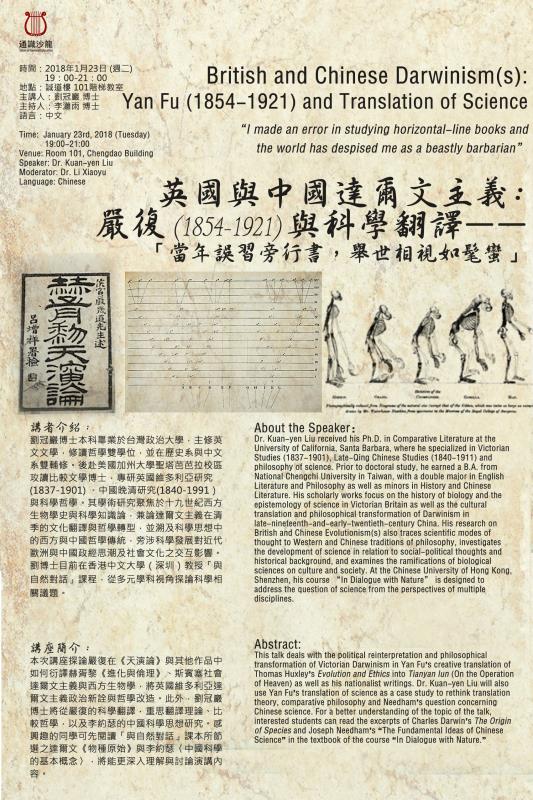British and Chinese Darwinism(s)
Title: British and Chinese Darwinism(s): Yan Fu (1854-1921) and Translation of Science── “I made an error in studying horizontal-line books and the world has despised me as a beastly barbarian”?
Date:January 23rd (Tuesday), 2018
Time: 19:00-21:00
Venue: Room 101, Chengdao Building
Speaker: Dr. Kuan-yen Liu
Moderator: Dr. Li Xiaoyu
Language: Chinese
?
?
Abstract:
This talk deals with the political reinterpretation and philosophical transformation of Victorian Darwinism in Yan Fu’s creative translation of Thomas Huxley’s Evolution and Ethics into Tianyan lun (On the Operation of Heaven) as well as his nationalist writings. Dr. Kuan-yen Liu will also use Yan Fu’s translation of science as a case study to rethink translation theory, comparative philosophy and Needham’s question concerning Chinese science. For a better understanding of the topic of the talk, interested students can read the excerpts of Charles Darwin’s The Origin of Species and Joseph Needham’s “The Fundamental Ideas of Chinese Science” in the textbook of the course “In Dialogue with Nature.”
?
?
About the Speaker:
Dr. Kuan-yen Liu received his Ph.D. in Comparative Literature at the University of California, Santa Barbara, where he specialized in Victorian Studies (1837-1901), Late-Qing Chinese Studies (1840-1911) and philosophy of science. Prior to doctoral study, he earned a B.A. from National Chengchi University in Taiwan, with a double major in English Literature and Philosophy as well as minors in History and Chinese Literature. His scholarly works focus on the history of biology and the epistemology of science in Victorian Britain as well as the cultural translation and philosophical transformation of Darwinism in late-nineteenth-and-early-twentieth-century China. His research on British and Chinese Evolutionism(s) also traces scientific modes of thought to Western and Chinese traditions of philosophy, investigates the development of science in relation to social-political thoughts and historical background, and examines the ramifications of biological sciences on culture and society. At the Chinese University of Hong Kong, Shenzhen, his course “In Dialogue with Nature” is designed to address the question of science from the perspectives of multiple disciplines.
?





